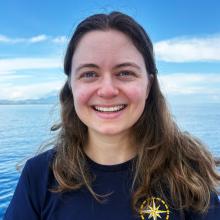
Lindsey Jones
Tell us about your work/ research. What kinds of things do you do?
I just started at OET this year, and I'm excited to join the team! On shore, I'll be helping scientists access our data–whether through working on our Science Portal or fulfilling data requests–and maintaining our technical infrastructure. At sea, I'll be providing IT support and making sure all of our communication, sensor, and data systems are working shipshape.
What sparked your initial interest in your career?
I always loved being in nature and was fascinated by the ocean. I also taught myself how to code as a kid and made websites for clubs and as a hobby. In college, I decided to study environmental engineering because I wanted to solve problems and create things that would help the environment. Ultimately, I found that the quick iteration style of coding was my favorite way to build things. So for my first full-time job, I took an opportunity to work at a company that hires software engineers from non-traditional backgrounds and spends the first few months training them, and I ended up really liking it. Then, at a conference, I attended a panel about ocean engineering and learned about the breadth of technological careers in ocean science. It felt like I finally found the career that combined all of my interests.
Who influenced you or encouraged you the most?
I had a lot of great teachers growing up, and I learned a ton from my managers and mentors at previous jobs. When I was looking to switch careers and go to grad school, I also reached out to people with research or jobs I was interested in–even if I had never met them–and I’m grateful for how generous they were with their time and advice.
What element of your work/ study do you think is the most fascinating?
I’m excited to learn lots of new technologies and systems. I also think coding can be really creative, and I’m looking forward to designing and updating our systems to maximize usability and efficiency.
How did you get involved with the Nautilus Exploration Program?
I knew of Nautilus Live from social media, so I was intrigued when I saw the job posted on an ocean-themed job board. I almost didn’t apply because I didn’t meet 100% of the criteria, but I’m so glad I did!
What other jobs led you to your current career?
In high school, I got some experience working in education through leading a LEGO robotics after-school program at a local elementary school and teaching swim lessons. My main job was a lifeguard, which helps me feel more confident working with other people on the water. In college, I did two environmental consulting internships, where I gained experience working in the field, taking initiative for my own work, and since I got to do something different almost every day, being flexible and learning in a fast-paced environment.
After graduating, I worked at a large online retailer as a software engineer and then as an engineering manager, which helped me develop my technical and leadership skills. Next, when I went to grad school, I worked as a graduate research assistant, collecting acoustic data around marine renewable energy converters and creating, updating, and then using programs to analyze the data in different ways. I’ve had a bit of a circuitous journey, but every step has helped get me where I am today.
What are your degrees and certifications?
Bachelor of Science in Environment Engineering, Certificate in Design Engineering – Northwestern University 2017
Master of Science in Mechanical Engineering – University of Washington 2024
What are your hobbies?
I love playing volleyball, swimming, skiing, going on nature walks, singing, and reading. I’m also trying to get into sewing clothes.
What advice would you give someone who wants to have a career like yours?
If you are interested in a technology career, I would definitely recommend looking for volunteer opportunities at clubs or organizations for causes you care about–pretty much everyone needs a website! I was the webmaster for a bunch of different clubs in high school and college, and it helped me develop my coding skills, gain experience, and contribute in a meaningful way.
In general, I would also recommend trying to hands-on experience (through research assistantships, volunteering, internships, camps, etc.) before fully committing to a career. I had always wanted to be a marine biologist, but when I went to a marine biology camp in high school, I discovered that I actually liked designing the methods and creating the instruments more than I liked conducting biology experiments itself. Therefore, I chose to go into engineering instead. That being said, my other work history should show you that changing careers is also totally possible!
Expeditions
Lindsey participated in the following Ocean Exploration Trust expeditions:
